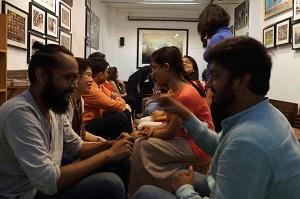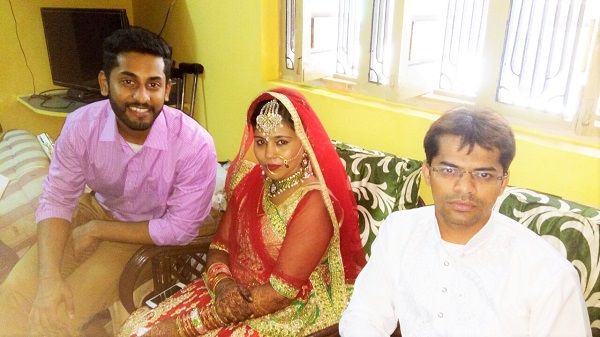
Inclov is a match making app which is not only inclusive in its approach, but actually has successfully managed to bring together a number of people with disabilities. Shankar Srinivasan, one of the founders of the app, talks about this initiative which is growing from strength to strength.
Inclov is an interesting concept. How did it come about?
The original idea came from my co-founder, Kalyani. We liked the concept of match making per se. In 2014 we started the venture as a match making agency, where an interested person could fill out their details on a contact form on the website which we would later print out. But there was the desire to fine tune it, which is why we started our research on people with disabilities. We wanted to find out what is required to make an app that can be made accessible for them. But little could we gauge the real magnitude of the problem. Our research revealed that there were 1.2 billion of people with disabilities across the world. We activated a campaign and raised about 10,000 dollars from global backers to build a prototype of the app. Then we finally launched the app in January this year.
Why do you think there is a need for a separate platform for people with disabilities and health issues? Is that truly inclusive?
Our app is for everyone, not only for people with disabilities. We built this platform keeping in mind all those who are single and are interested in finding a partner. So it is truly inclusive. We do not prevent anyone from signing up. But our focus will always be on people with disabilities.
Is the platform truly accessible for people of all disabilities? How have you done that? What more needs to be done?
One of the people who developed the app is, in fact, visually impaired. For the visually challenged applicant, certain things have been taken into consideration, like different colour schemes and magnifiers for low vision. We have also made provisions for people with cerebral palsy who sometimes find it difficult to swipe the app; they can instead tap on it. We are also trying to address other kinds of difficulties – for instance, for people who have no upper body mobility. Unfortunately, we cannot address every disability, but we are working on the app all the time to make it as user-friendly as possible. That is our USP. We are also planning to introduce video calling for those used to sign language. And we also have the provision for various languages. There are, of course, a lot that we need to do to make our app even more accessible.
What are the most common challenges you face?
There are two important things that we came to realise after the launch of the app. The first is, for this community their shift has been drastic as far as our app is concerned. Match making has evolved gradually for us, as we have gradually got used to matrimonial columns in newspapers to websites etc. But for this community who have not been a part of this gradual process, this app has been a drastic experience. But this app definitely gives them the anonymity and dignity , for instance, something like a Swayamvar mela would deny, a rather undignified way of match making. So for people with disabilities, this app is something very new and they are also sometimes very unsure of trying it out. They are not sure whether it will work for them. Secondly, they also sometimes feel that this app might end up being like any other platform. But on this platform, it is not religion or caste or creed which is really the deciding factor. The applicant needs to know whether the disabilities are compatible. There is also a feedback option on the app through which they write to us, and they can also get back to us if they have any query.
What have been your biggest achievements? And failures?
One achievement which comes to mind goes like this: Before we launched the app, we had pre-registered 100 users on the app. There was one particular girl who I had to convince for two days to register. She has been trying for a match for the last 6 years, but had failed. Within a week of joining us, she found a match, and she called me up to say that she was getting married in three months. That was certainly a Eureka moment for us! 2000 matches have already taken place through our app. But we feel we need to go faster than we are. We are trying for a lot more people on our platform and a lot more marriages.
How do you ensure safety for the people on your platform?
When we talk of safety, we mainly talk of safety for women. We don’t display full names, only the first name. We have disallowed screen shots on the app, so that pictures cannot be circulated etc. We don’t display phone numbers or email ids. We do ask for these details, but those are strictly for our personal records. We are also putting in more effort to ensure the correctness of information given. We also encourage Id proofs and disability certificates. The latter validates the percentage of disability the person suffers from.
What have been the most exciting and surprising findings?
For the first 4 months after launching our app, I would personally call every user every single day just to understand the experience of using the app. I asked for some references also. Talking to a lot of women who were not using the app. I thought the main reason was a lack of awareness of the app. But a lot of them knew about the app but did not sign up because they were not too sure about getting married, because of failed attempts. Sometimes even families were not too encouraging. After learning this, my whole marketing and communication changed. I bought this blog series which is a 10 week blog series which showcases successful marriages of people with disabilities from a woman’s perspective, as to what society told her and how she dealt with it. That seemed to have an impact. Yet another thing which surprised us was that about 50 per cent of our user base is without disabilities. We expected it to be around 10 to 20 per cent, but this finding pleasantly surprised us.
How do you ensure enough adoption by women given the cultural mindset? How do you support overcoming the inhibitions.
We try to make sure in telling women that it is as much for you as for anyone else. Do give it a shot. And we also assure them that we will take care of your safety.
How do your social spaces initiative complement the online matchmaking services?
App is one thing where you can hide your identity and talk. But these people are not so forthcoming about actually going out and meeting these people, and this is specially applicable to women. So our effort has been to go to every city and call them over for a gathering. We organise Stand up comedies, salad making competitions as well as band performances in a bar and even poetry slams. Most of these people have never even been inside a bar, so it was a great experience for them, to feel a part of the crowd. We have done 10 of these super popular programmes in Metros like Delhi/NCR, Chennai, Bangalore and Mumbai where we get an attendance of 60 to 70 people.
What are your future plans and where do you want to go from here?
Our next step is that we are already working on another version of the app which promises to give you the closest match. We also want to make it a global product, take it to the US and then other countries. We are aiming to organise about 100 social meet ups and take these gathering to Saarc countries as well. Right now we are restricting to India, but we certainly intend to go global with it.
For the last eight years, Anisha Banu Multani had been looking for love, but it seemed to evade this 30-year-old. Until, of course, she recently met Garana Imran M. Both affected by polio, they've had their share of struggles—within family, at jobs and in finding a suitable partner to marry.

On February 5, the families of Multani and Imran met, and the dates for their wedding was finalised. The two tied the knot on May 13.
For more details read here
https://bangaloremirror.indiatimes.com/columns/you/Where-anyone-can-find-love/articleshow/50998220.cms






